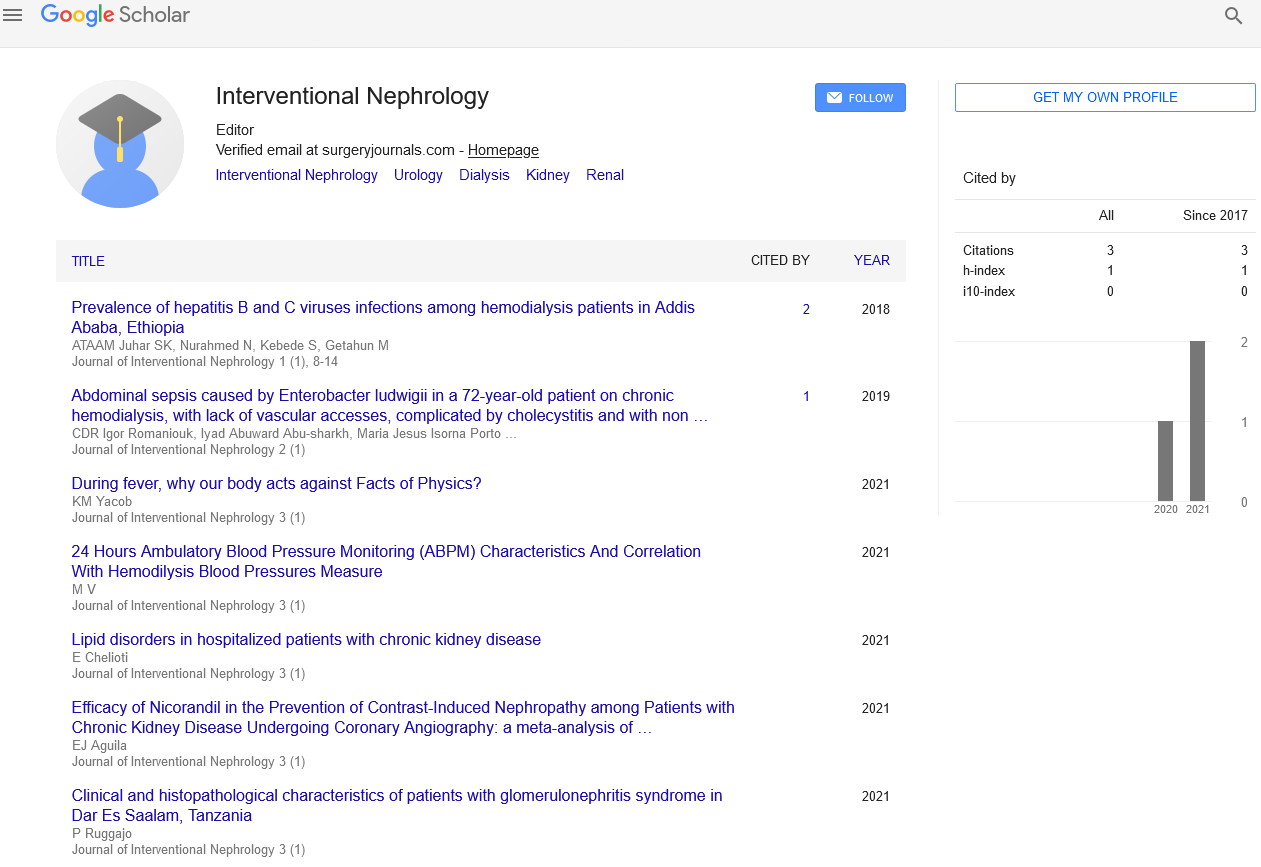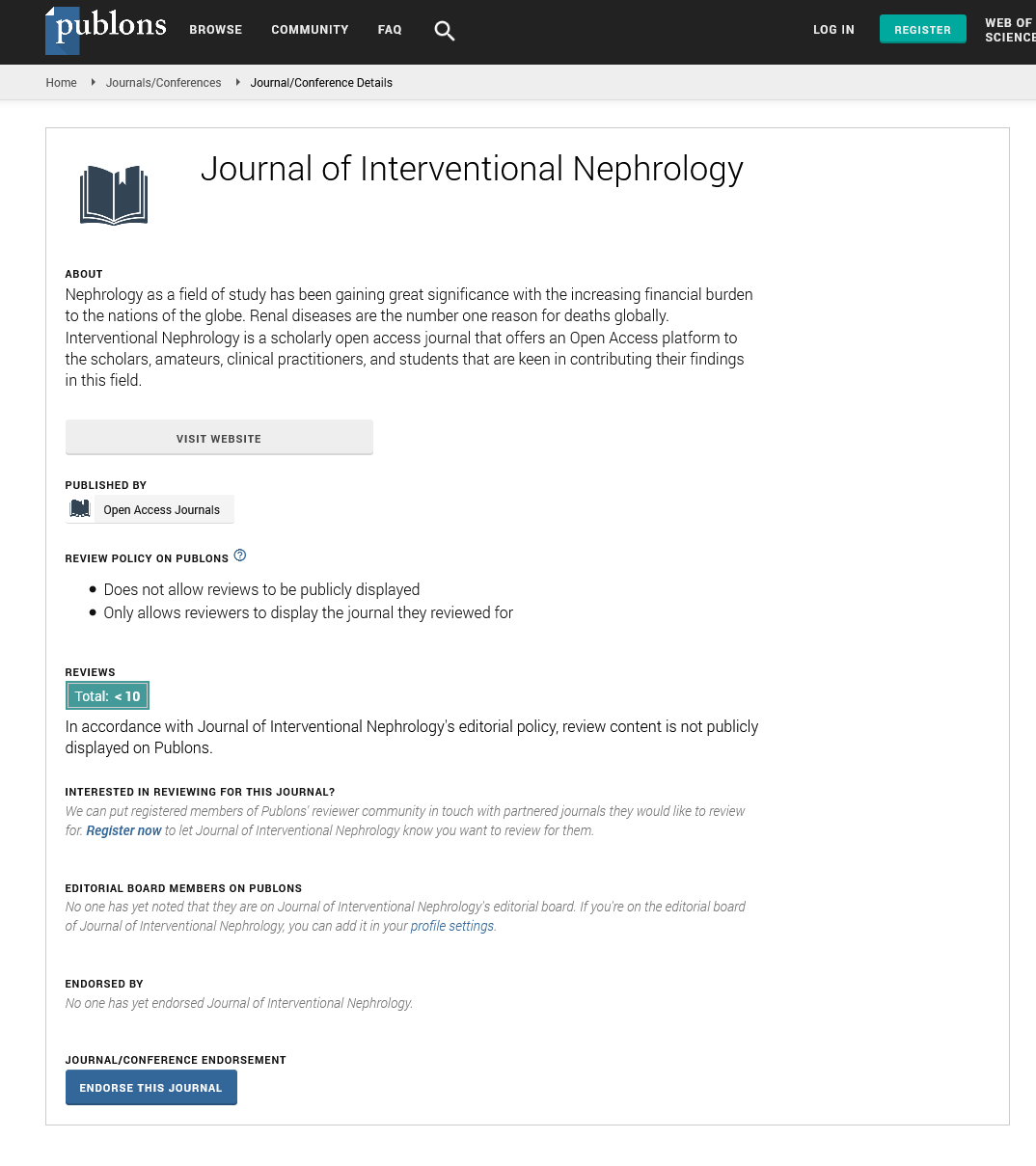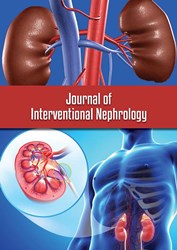Perspective - Journal of Interventional Nephrology (2022) Volume 5, Issue 3
Covid-19 and Chronic Renal Disease
Albert Santoro*
Affiliation Specialty School of Nephrology, University of Bologna, Bologna, Italy
Affiliation Specialty School of Nephrology, University of Bologna, Bologna, Italy
E-mail: santoro01@gmail.com
Received: 02-Jun-2022, Manuscript No. OAIN-22-57866; Editor assigned: 06-Jun-2022, PreQC No. OAIN-22- 57866(PQ); Reviewed: 20-Jun-2022, QC No. OAIN-22-57866; Revised: 23-Jun-2022, Manuscript No. OAIN- 22-57866(R); Published: 30-Jun-2022, DOI: 10.37532/oain.2022.5(3).23-25
Abstract
Our meta-analysis of early and preliminary data suggests that CKD may increase the likelihood of developing a severe COVID-19 infection. Therefore, it is important to encourage patients with CKD to take extra precautions to reduce their chance of contracting the virus. Additionally, doctors should closely evaluate CKD patients with suspected COVID-19 to identify early warning symptoms of disease development. Finally, in future risk stratification models for COVID-19, the existence of CKD must be taken into consideration as a significant factor.
Keywords
Broken bones • poor nutrition, damaged nerves • anemia • chronic kidney disease • COVID-19 • dialysis • neutrophils, inflammation
Introduction
Numerous conditions that affect your kidneys and lessen their ability to keep you healthy by filtering waste from your blood are referred to as “chronic renal disease.” If renal illness progresses, wastes may build up in your blood in excessive amounts, making you feel sick. Broken bones, poor nutrition, damaged nerves, and anemia (low blood count) are only a few possible complications [1].
If you have renal disease, you have a higher risk of developing heart and blood vessel issues. These problems may develop gradually and over time. Early detection and therapy can frequently prevent the course of chronic renal disease. Renal failure, which necessitates dialysis or a kidney transplant to be alive, might eventually arise from kidney disease if it is not addressed. Identification of risk variables for severe infection is crucial to enable risk classification, optimize the reallocation of hospital resources, and direct public health recommendations and actions as the new Coronavirus Disease 2019 (COVID-19) outbreak spreads [2].
Chronic Kidney disease
(CKD) is linked to a higher risk of pneumonia in both inpatients and outpatients. Additionally, CKD patients tend to have a 14–16 times higher mortality risk from pneumonia than the overall population. The purpose of this article is to investigate any possible links between CKD and the severity of COVID-19 infection.
The essential characteristics of included studies are summarized. Whilst the individual and pooled ORs for CKD predicting severe COVID-19. No study individually found CKD as significant clinical predictor of severe COVID-19. However, when data of individual studies were pooled, a significant association of CKD with severe COVID-19 was observed, with no relevant heterogeneity [OR 3.03 (95% CI 1.09–8.47), I 2=0.0%, Cochran’s Q, p=0.84]. A recent meta-analysis of preliminary and early data suggests that CKD may increase the likelihood of developing a severe COVID-19 infection [3].
Therefore, it is important to encourage patients with CKD to take extra precautions to reduce their chance of contracting the virus. Additionally, doctors should closely evaluate CKD patients with suspected COVID-19 to identify early warning symptoms of disease development. Finally, in future risk stratification models for COVID-19, the existence of CKD must be taken into consideration as a significant factor.
Kidney-affecting diseases and conditions
Autoimmune diseases
When a person has an autoimmune illness, their own cells, tissues, and organs are attacked by their own immune system. Many of these conditions, like lupus and IgA, can also affect and assault the kidney.
Some immunosuppressive medications may be recommended to people with autoimmune diseases by their doctor (depending on the disease and other factors). The way these drugs function can make it more difficult for the body to fight infections since they suppress the immune system’s activity. Recommendations to reduce risk from COVID-19:
• keep taking any medicine as prescribed
• wash your hands
• maintain good hygiene
• follow recommendations from your healthcare team
• You should contact your healthcare professional for any questions or concerns.
• You can find information on general COVID-19 prevention at the Centers for Disease Control (CDC) website.
Underlying medical conditions: In addition to having received a kidney transplant or receiving dialysis, persons might have additional underlying medical issues.
Some of these conditions are:
• Chronic lung disease or moderate- to-severe asthma
• Serious heart conditions
• Immune compromised due to cancer treatment, smoking, bone marrow transplantation, immune deficiencies, HIV or AIDS, and prolonged use of corticosteroids and other immune weakening medications
• acute obesity (body mass index [BMI] of 40 or higher)
• Diabetes
• Liver disease
• Acute kidney injury (AKI)
COVID-19 patients at significant risk of AKI
A new comprehensive report shows that people hospitalized with COVID-19 are at significant risk of AKI, which can lead to serious illness, dialysis, and even death. The study found patients with COVID-19, who were hospitalized between March 11 and April 26, were twice as likely to develop AKI as compared to non-COVID patients who developed AKI during the same time period in 2019 – 56.9% versus 25.1% respectively. AKI appears to be a marker of COVID-19 infection severity and the mortality rate is higher for these patients.
Various COVID-19-related effects that are thought to contribute to AKI include kidney tubular injury (acute tubular necrosis) with septic shock, micro inflammation, increased blood clotting, and probable direct infection of the kidney. Most patients with COVID-19- related AKI who recover continue to have low kidney function after discharge from the hospital [4].
Long term implications of acute kidney injury
It’s recommended that recovered COVID-19 patients who had an AKI or ARF should be seen regularly by a kidney doctor, because their risk of developing chronic kidney disease is higher than others. COVID-19 patients who did not develop an AKI, but who had blood and/or protein in their urine, should be monitored since they are at increased risk of developing chronic- and end-stage-kidney disease.
The link to kidney disease
Acute kidney injury, also known as acute renal failure (ARF), is not the same as chronic kidney disease (CKD), which will eventually lead to chronic kidney failure (CKF). Neither CKD or CKF are reversible diseases. Detecting proteins and/or blood in urine labs is an early sign of kidney involvement in people with confirmed COVID-19.
Kidney failure in otherwise healthy adults
There have been recent reports of nonelderly adults infected with COVID-19 who have developed an acute kidney injury (AKI) — sudden loss of kidney functions. These adults did not have underlying medical conditions. With proper treatment, including dialysis in severe cases, AKI can be reversible.
Conclusion
COVID-19 patients with CKD presented high incidence of neutrophilia, poor prognosis and in-hospital death, with dialysis patients being more vulnerable. COVID-19 patients with CKD presented high incidence of neutrophilia, poor prognosis and in-hospital death, with dialysis patients being more vulnerable [5]. Therefore, patients with malnutrition, diabetes and obesity might require personalized nutrition advice to improve their health during this pandemic of COVID-19. Since there are no pharmacological strategies yet for the prevention or treatment of a viral disease like COVID-19, enhancing immunity by nutritional strategies could be a beneficial and low-cost approach that needs to be explored. Achieving a balanced and diverse diet in the current global context with limited movements and, therefore, meeting recommended amounts of calories and micronutrients will be a challenge. However, supplementation with selective micronutrients may be beneficial especially for vulnerable populations such as the elderly. In addition to the survival and patient’s outcome, injury to the kidneys can impair metabolism, excretion, dosing and expected concentrations of the medications. As a result, frequent and careful monitoring of kidney function in patients with COVID-19 can lead to early diagnosis of kidney disorders, achieving the optimal therapeutic concentrations, and better management of the disease. However, given the lack of experimental and clinical data, the precise therapeutic relevance of supportive treatments and nutritional supplements remains obscure. Future studies employing clinical cases are required to confirm the observed protective effects of more nutritional supplements.
References
- Ajaimy M, Melamed ML. COVID-19 in Patients with Kidney Disease. Clin J Am Soc Nephrol. 15, 1087–1089 (2020).
- Gansevoort RT, Hilbrands LB. CKD is a key risk factor for COVID-19 mortality. Nat Rev Nephrol. 16, 705–706 (2020).
- Pakhchanian H, Raiker R, Mukherjee A et al. Outcomes of COVID-19 in CKD Patients: A Multicenter Electronic Medical Record Cohort Study. Clin J Am Soc Nephrol. 1–2 (2021)
- Santoro A, Gibertoni D, Rucci P, et al. The PIRP project (Prevenzione Insufficienza Renale Progressiva): how to integrate hospital and community maintenance treatment for chronic kidney disease. J Nephrol. 32: 417–427 (2019).
- Brück K, Jager KJ, Zoccali C, et al. Different rates of progression and mortality in patients with chronic kidney disease at outpatient nephrology clinics across Europe. Kidney Int. 93: 1432–1441 (2018).
Indexed at, Google Scholar, Crossref
Indexed at, Google Scholar, Crossref
Indexed at, Google Scholar, Crossref
Indexed at, Google Scholar, Crossref


